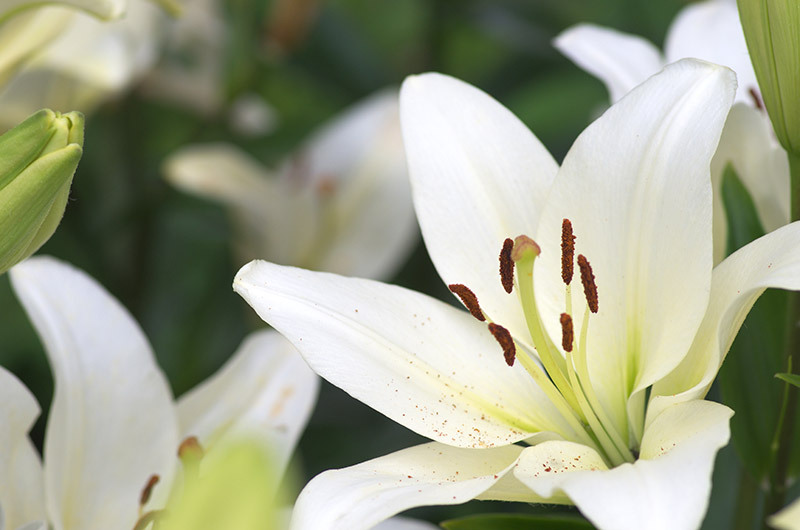The Colorful Symbolism of Peony Flowers Unveiled
Posted on 18/08/2025
The Colorful Symbolism of Peony Flowers Unveiled
The peony flower is not just a beautiful addition to gardens and floral arrangements; it is also a powerful symbol, deeply rooted in various cultures and traditions around the world. With their lush petals and intoxicating fragrance, peonies offer more than mere aesthetics--they carry rich meanings and messages that have evolved throughout history. In this article, we peel back the petals to uncover the colorful symbolism of peony flowers, exploring their significance, meanings by color, roles in different cultures, and why they continue to captivate hearts today.

The Enchanting History of Peony Flowers
Originating from Asia, Southern Europe, and Western North America, peony flowers have graced gardens and celebrations for over 4,000 years. Botanical records trace the beloved peony back to ancient China, where it became known as the "King of Flowers." Revered for its beauty and medicinal properties, this glamorous bloom quickly spread across continents, acquiring different cultural and symbolic associations along the way.
Mythology and Folklore
Peonies are enveloped in mythology and legendary tales:
- Greek Mythology: According to one tale, Peony was a nymph admired by Apollo. Out of jealousy, another goddess turned her into a peony, immortalizing her beauty in floral form.
- Chinese Folklore: The peony is a symbol of prosperity, wealth, and honor, earning its nickname "the wealth flower."
Medicinal and Ornamental Uses
While today's peonies are known for their vibrant appearance, ancient civilizations valued them for their medicinal uses, believing the roots and seeds could treat a plethora of ailments. Nevertheless, it is their striking visual appeal and layered blossoms that have earned them a lasting place in decorative arts and gardens worldwide.
Different Peony Flower Colors and Their Symbolic Meanings
One of the reasons peonies are universally adored is their wide spectrum of colors, from purest white to deep, dramatic crimson. Each color of peony carries unique significance, making it crucial to select the right hue for every occasion. Below, we explore what different shades of this enchanting flower symbolize:
Pink Peonies: Romance and Affection
Pink peonies are perhaps the most popular variation, frequently used in weddings and romantic celebrations. Their delicate blush signifies:
- Love
- Affection
- Good fortune
In many cultures, giving pink peonies is a heartfelt gesture of admiration and a wish for a prosperous future together. They are the top choice for bridal bouquets, symbolizing a happy marriage and everlasting friendship.
White Peonies: Purity and Apology
The elegance of white peonies represents:
- Purity
- New beginnings
- Remorse or apology
This makes them a popular choice in wedding ceremonies as well as occasions where one wishes to seek forgiveness or mark a fresh start. In Chinese culture, white peonies are sometimes used in funerals, denoting peace and light in the afterlife.
Red Peonies: Passion and Honor
The bold, attention-grabbing red peony flower symbolizes:
- Passion
- Respect
- Honor and prosperity
Red peonies are especially significant in Chinese culture, where red is the color of good luck and celebration. They are often present at festive occasions, including weddings, New Year's celebrations, and milestones, to bring joy and abundance.
Yellow and Gold Peonies: Growth and New Opportunities
Though rarer, yellow and gold peonies have their own unique allure, symbolizing:
- New beginnings
- Positive energy
- Growth and renewal
For those embarking on new ventures, gifting yellow peonies conveys good wishes for success and happiness ahead.
Purple Peonies: Mystery and Nobility
Purple peonies represent:
- Enigma
- Nobility
- Luxury
They evoke a sense of magic and wonder, making them perfect for expressing admiration for someone's unique qualities or celebrating a grand, sophisticated occasion.
Coral Peonies: Enthusiasm and Desire
The vibrant, warm hues of coral peonies are a symbol of:
- Desire
- Energy
- Enthusiasm
These peony flowers are ideal for expressing heartfelt excitement and hope for the future.
Peony Flowers in Cultural Symbolism Around the World
The symbolism of peonies varies widely across cultures, with each region assigning its values and beliefs to this stunning flower.
Peonies in Chinese Culture
In China, peonies, or "Mudan" (??), are the ultimate symbol of wealth, honor, and high social status. They frequently appear in Chinese art, literature, and imperial gardens, often depicted alongside dragons and phoenixes to amplify their auspicious nature. The peony is the official flower of the city of Luoyang, home to famous peony festivals that attract millions of visitors every spring.
- Feng Shui: Peonies are believed to bring good luck, romance, and prosperity into the home.
- Traditional Medicine: Peony roots and petals are used for their purported healing properties.
The Peony in Japanese Culture
In Japan, the peony, known as "Botan" (???), signifies bravery, honor, and good fortune. Samurais adorned their crests with peony imagery to represent grace, strength, and an admirable spirit. Today, the flower remains integral in art, tattoos, and traditional festivals.
Peony Symbolism in the Western World
In Victorian England, peonies became associated with bashfulness and shyness, possibly due to the drooping nature of the blossoms. Over time, the flower took on additional meanings, such as:
- Romantic love
- Good fortune
- Happy marriage
Paeonia is also celebrated as the official 12th wedding anniversary flower in modern-day western countries, symbolizing the strength and richness of a mature union.
The Language of Peonies: Messages in a Bloom
Floriography, the "language of flowers," was a Victorian-era practice where flowers sent secret messages. Peonies, with their layers of meaning and color variations, played a vital role in this subtle form of courtship and communication.
- Giving Peonies: Presenting someone with peonies can mean anything from "I wish you happiness" to "My heart is forever yours," depending on the context and color.
- Receiving Peonies: Receiving a bouquet of these lush blooms is generally considered a sign of good fortune and love.
Peony Flowers in Art, Design, and Pop Culture
The lush, romantic appearance of peonies has inspired countless artists, designers, and pop culture icons. Peony motifs are common in:
- Fine art paintings
- Textile and fashion design
- Decorative homeware
- Tattoo art
Their symbolic resonance--from romantic love to prosperity--makes them a versatile and enduring theme, transcending borders and trends.
Famous Uses in Western and Asian Art
Peonies are a recurrent motif in Chinese scroll paintings and Japanese woodblock prints, symbolizing both the fleeting and enduring beauty of life. In the West, renowned artists such as Edouard Manet and Pierre-Auguste Renoir captured the peony's fullness and lushness on canvas, using it as a metaphor for abundance and sensuality.
Peony Flower Symbolism in Modern Life
The meanings of peony flowers are not relics of the past--they are found in modern weddings, interior decoration, and personal gifting. Here is how peonies continue to brighten and symbolize important moments today:
Weddings and Anniversaries
The romantic symbolism of peonies makes them a favorite flower for:
- Bridal bouquets
- Wedding decor
- Anniversary celebrations
They represent a happy, prosperous marriage and a wish for abundant love and good fortune in the newlyweds' life.
Home Gardens and Landscaping
Planting peonies in home gardens is believed to attract positivity, harmony, and prosperity. Their vibrant colors and intoxicating scent turn each spring blooming into an event, drawing people and pollinators alike.
Personal Gifting and Gesticulation
The thoughtful gift of peonies delivers nuanced messages--whether it's a declaration of love, an apology, or a hopeful wish for the future. Their rich symbolism adds a personal layer to any bouquet, making occasions all the more special.
Peony Symbolism in Literature and Poetry
For centuries, peonies have inspired poets and writers as emblems of both outer beauty and deeper meaning. Chinese poets often reference peonies to evoke riches, feminity, and fleeting moments, while western authors focus on their lushness and dramatic appeal. Their mention in works ranging from classical verse to modern novels continues to fortify their symbolic stature in our imagination.

How to Use Peony Symbolism in Your Own Life
Want to harness the positive and inspired meanings of peony flowers? Here are some ideas:
- Choose pink peonies for romantic gestures or bridal arrangements.
- Plant a red peony bush at home to get a dash of good fortune and festive energy.
- Gift white peonies as an apology or to celebrate new beginnings.
- Select yellow peonies to wish someone success or a positive change.
- Incorporate peony imagery in home decor to invite harmony and beauty.
Conclusion: The Lasting Allure of Peony Flowers
The colorful symbolism of peony flowers endures as a testament to their beauty and the profound meanings they carry across different cultures and generations. From signifying love, honor, and prosperity to representing new beginnings and heartfelt apologies, peonies are much more than luxurious, showy blooms. They are lasting emblems that continue to inspire, comfort, and celebrate human experiences.
No matter how you choose to incorporate peony flowers into your life--whether as a gift, a garden staple, or a work of art--you tap into a rich tradition that spans centuries and continents. Let the many-hued petals of the peony unfold their joyful messages, filling your world with meaning, beauty, and hope.
For more insights into the fascinating world of flower symbolism, stay tuned for our upcoming features on floral meanings and garden inspiration!
Latest Posts
Colorful Birthday Bouquet Ideas
Harness 3 Uncomplicated Techniques for Flower Freshness
Boosting the Endurance of Your Poinsettia Flora





